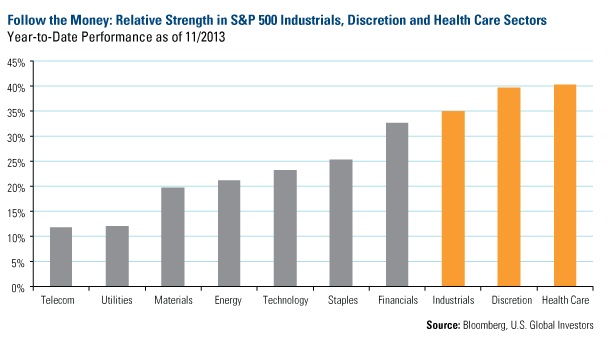Did the Government Shutdown Help the Economy?
From New Delhi to San Francisco to London, and finally back in San Antonio, I’ve been communicating one consistent theme to investors: Follow the money.
What’s really important in following the money is for investors to not get caught up in the negative web spun by the media. There’s a lot of drama these days about Obamacare and Washington dysfunction. Take the government shutdown in October, when the House and Senate fought over the debt ceiling. Economic data wasn’t released, services were halted, national parks were closed, and “non-essential” government workers were told to stay home.
As a result, GDP was expected to collapse.
Yet, data released this week reveal a different, stronger image of the U.S. economy. I think Shakespeare would deem the media’s fear mongering tactics as “Much Ado About Nothing.”
Third-quarter GDP growth was recently revised to 3.6 percent, much higher than the estimated 2.8 percent figure. In November, more jobs were created and the unemployment rate fell to 7 percent. Not a spectacular result, but better than expected.
Perhaps people are gaining confidence in the U.S. economy, as figures show a buying spree in large purchases of new homes and vehicles.
In October, U.S. new home sales rebounded from a one-year low. According to Bloomberg, sales increased more than 25 percent, despite “this year’s increase in borrowing costs and property values.” As a “sign of growing momentum” for the housing market, applications for building permits also climbed to a five-year high, says Bloomberg.
Many garages will be filled with new cars and more expensive trucks and sport utility vehicles, as 16 million automobiles were sold in November, the fastest pace since February 2007, according to Autodata. American automobile makers “drove the blistering sales month,” with General Motors sales growing nearly 14 percent and Chrysler sales increasing 16 percent in November, says USA Today.
These facts support what we’ve been seeing in the U.S. purchasing manager’s index (PMI), which climbed to a ten-month high in November. Generally, PMIs are a leading indicator of future economic trends.
So, we shouldn’t hope for a government shutdown again … or should we?
Here’s a Simple Way to Follow the Money: Look for the leaders and understand the laggards. Here’s a chart showing the top sector performance among the S&P 500 Index since January. With the revolution occurring in the health care industry, the sector has seen an incredible 40 percent increase, closely followed by consumer discretionary. Industrials stocks, which rose about 35 percent, have gotten a boost from PMI’s jumper cables.
Meanwhile, defensive areas such as telecommunications and utilities have lagged, as rising interest rates have made these defensive companies’ dividend yields less desirable.

To get an idea of the companies held in each of these sectors, the following are the largest stocks in terms of market capitalization: In industrials, General Electric (GE) is the biggest; in consumer discretionary, Amazon (AMZN) takes the lead; and in health care, it’s Johnson & Johnson (JNJ).
On a year-to-date basis, in industrials, airlines such as Delta (DAL), have taken off. Among discretionary stocks, Netflix (NFLX) is the leader, and within the health care sector, biotechnology companies, such as Celgene (CELG), have increased the most.

Ranking sectors and stocks this way, it’s easy to identify and follow the leaders. It’s like Newton’s First Law of Motion: once in motion, these stocks tend to stay in motion.
We believe the domestic bull run will also stay in motion, as the synchronized global recovery continues to take place. Just this week, Japan announced additional fiscal stimulus. In addition, China continues to grow, with sweeping economic reforms taking place, and Europe is expected to recover. Further, based on fund flows of investors selling their bonds and buying equities, we expect this trend to continue for a while. As I often say, trying to stop a bull market has risks.
Get commentaries like this every week! Share your email address and we’ll send you the free weekly Investor Alert published on Friday evenings. You can also keep informed by following us on LinkedIn, Twitter or Facebook.
All opinions expressed and data provided are subject to change without notice. Some of these opinions may not be appropriate to every investor. The S&P 500 Index is a widely recognized capitalization-weighted index of 500 common stock prices in U.S. companies. The Purchasing Manager’s Index is an indicator of the economic health of the manufacturing sector. The PMI index is based on five major indicators: new orders, inventory levels, production, supplier deliveries and the employment environment. Standard deviation is a measure of the dispersion of a set of data from its mean. The more spread apart the data, the higher the deviation. Standard deviation is also known as historical volatility. The following securities mentioned were held by one or more of U.S. Global Investors Funds as of 9/30/13: General Electric, Amazon.com, Celgene.






 Frank Holmes is the CEO and Chief Investment Officer of
Frank Holmes is the CEO and Chief Investment Officer of 









